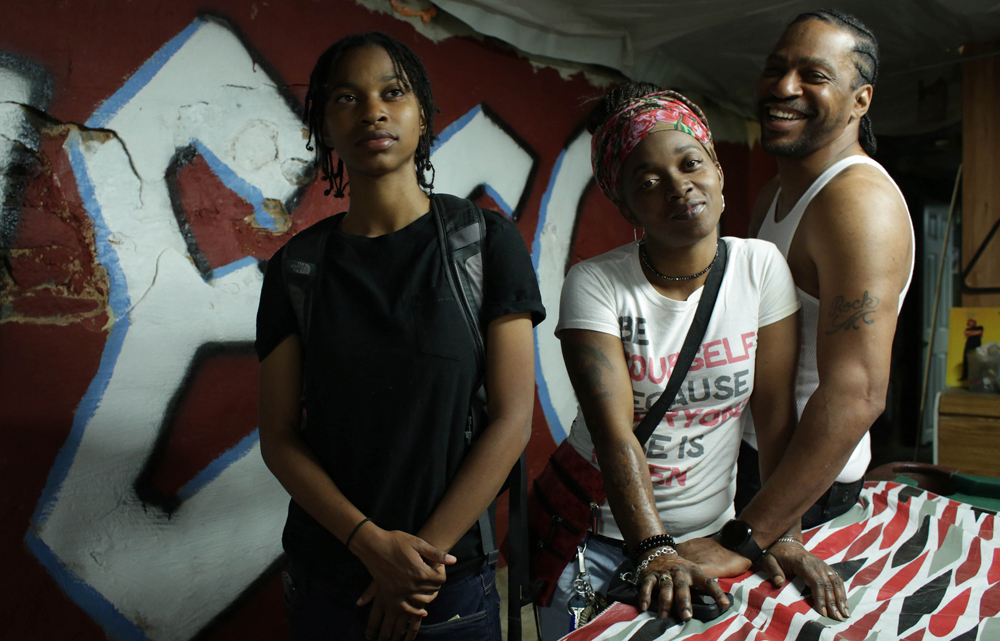In the exquisite film “Quest,” which tracks eight years in the life of the Raineys, an extraordinary family out of North Philly, there’s a moment when Chris “Quest” Rainey is invited onto a radio program where he describes how he hasn’t seen his wife break down in the wake of a devastating event that affects their young daughter Patricia, nicknamed PJ. You might expect Christine’a, his better half, to finally do so when the camera pans to her on the other side of the studio, but it’s more surprising that she doesn’t, having a tortured look in her eye that suggests she desperately wants to let it all out, but can’t because she knows it would be the fissure that could lead to her entire family falling apart. Having survived a house fire at 18, this too shall pass.
Such a stirring moment is what happens when you spend eight years, and then some without a camera, following a family as director Jonathan Olshefski did for “Quest,” and the result is one of the most beautiful, moving portraits of a family committed to the screen in recent memory. While Olshefski, editor Lindsay Utz and composer T. Griffin bring considerable grace to telling the Raineys’ story, the luminescent clan living just above the poverty line in a neighborhood where violence is all too common needs no embellishment, radiant in their protection of each other and their strength. With a patriarch in Chris who credits his mother with teaching him to be “constructive not destructive,” the family, which also includes Christine’a’s 21-year-old son William from another relationship, has little in physical possessions, but plenty to be proud of, as Chris, a music producer/promoter, opens up his recording studio on Fridays to young men in the area who allowed to vent their frustrations into the mic rather than in the streets, and Christine’a is holding things down with a job at a domestic violence shelter for women, keeping the gas on at the house and finding a way to help the community.
“Quest” begins in 2008, setting the film directly against the backdrop of Barack Obama’s presidency, and though the election of the first African-American to the White House broke new ground, the Raineys are living proof of how far there is left to go in terms of creating true racial equality as you see how unnecessarily difficult their lives are. Olshefski is careful to consistently show North Philly in a positive light – the way the ever-optimistic Chris sees the world around him where kids do backflips in the streets when they’re shut down for block parties and conversations on local talk radio, where Chris is a regular, sound like old friends chatting it up on the porch. But when Chris is hassled by the police on occasion, and Christine’a is asked to take care of William’s son Isaiah while he’s battling cancer, with both all the while working full-time jobs — Chris delivers papers during the day — that barely cover the rent, it’s remarkable to see the Raineys keep their heads up high and raise their child PJ to think for herself without any sense of defeat.
This makes it all the more deeply upsetting when PJ is put in harm’s way, but “Quest,” like the Raineys, takes it in stride, finding great dignity and beauty in the family’s ability to carry on and somehow grow even closer. The gentle, persistent rhythm of the film’s pacing subtly underlines the family’s continual push forward against all odds and since you feel so incredibly lucky to spend any time in their company, the years pass by in a blink, most evident in PJ, who becomes a teenager right before our eyes. But with cultural touchstones throughout, seeing the film in this moment when our lives have run parallel makes “Quest” especially poignant – to understand the difference we can make in our communities with small gestures and the power of simply enduring under the most trying of circumstances. When Chris and PJ attend a gun violence rally late in the film, a community activist implores the crowd gathered around him to look inwards rather than to pop culture for their idols, saying, “Our role models should be us.” Looking at the Raineys, you can’t think of anyone else you could look up to more.
“Quest” does not yet have U.S. distribution. It plays once more at the Sundance Film Festival on January 27th at 9 pm at Yarrow Hotel Theatre.




